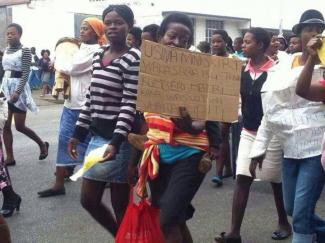On October 4th, hundreds of women brought Harare traffic to a standstill during the Reclaiming our Streets march against attacks on women wearing short skirts. Their action was met with heckling, catcalls and further harassment from men. The response to the march reaffirms the need to address the real threats and intimidations faced by women standing up for their rights in Zimbabwe, and develop strategies to assure women’s control over their bodies and safety from violence in all its forms.
“We live in a society where women’s bodies are contested zones,” says Katswe Sistahood’s Winnet Shamuyarira. “Look at how women’s bodies are monitored in terms of sex and sexuality, what a woman should wear and how she should behave, even morality myths around virginity – there are many issues involved but it boils down to the fact that a woman’s body is never hers.
The march came in the wake of a violent attack on a young woman for daring to wear a miniskirt in September 2014. Historically, Zimbabwe’s urban areas have been highly challenging and often exclusionary spaces, particularly for women and other marginalised people for example LGBTI persons, sex workers and differently-abled people. Bus and taxi drivers are notorious for harassment, often violent, of women in public spaces, and attacks and the forced stripping of women wearing what are considered to be ‘revealing’ clothing have plagued the city for years.
As a direct action, the march was a powerful opportunity for women to rally around this one aspect of how women’s bodies are controlled. For Katswe, a JASS Southern Africa partner and the lead organiser of Reclaiming our Streets, this protest is part of a larger critique on how women in Zimbabwe are subject to harassment and abuse reinforced by cultural ideas about who owns our bodies.
Women, many wearing bright colours, low cut tops and miniskirts, took to the streets shouting, “My body, not our body,” and “Ikodzero yedu kupfeka zvatoda (It’s our right to wear what we want)!” Ironically, or perhaps inevitably, their attempt to reclaim their bodies was met with unbridled aggression, heckling, and catcalls. Despite the relative safety of numbers, Katswe Sistahood’s members were harassed by men, including touts and faced explicitly sexist and misogynistic threats of violence, including rape. Riot police on-site who were ostensibly there to protect the women marchers stood idly by as Shamuyarira describes, “There was a rowdy crowd surrounding us from every side, jeering at us and the policemen did nothing. It was a situation where the police said ‘we’re protecting you’ but they were not there to protect us at all.”
Protection & Safety for Women
For Katswe Sistahood, the protest shone a stark light on not only the backlash that comes when women take action and defy moral codes that restrict their rights over their bodies but also the need to strategise more deliberately around safety and security. Feminist activist and writer, Dudziro Nhengu asks: “How do we fight for our rights, take action in ways that do not put us at risk, and protect ourselves? Also, what does feminist protection, safety and security look like?” JASS Southern Africa’s Heart—Mind—Body initiative is supporting Zimbabwean women activists to strengthen and rebuild their own communities of solidarity, report and monitor women’s human rights abuses, and develop collective solutions to insecurity, violence and other threats that they experience daily.
“Our analysis has taught us that if we are in the business of dismantling power, something will come at us and those things have the power to destabilise and destroy…. We’ve tried hard to build ourselves as women human rights defenders (WHRDs) and to plan for safety and security. In the [safe] spaces that we build together, we laugh, cry, dance and rage but we also strategise.” ~ Women human rights defender, Zimbabwe
In November 2013, the UN Human Rights Council adopted a vital resolution furthering the protection of human rights defenders globally with a particular emphasis on women human rights defenders who are targeted not just for their work but also their gender. As part of JASS’ global strategy to put the situation of women human rights defenders on the global human rights agenda, JASS Southern Africa met at the United Nations 21st Annual Meeting of the Special Procedures of the Human Rights Council. Represented by regional director, Shereen Essof, it was an important moment to shine a spotlight on WHRDs who are at the forefront of struggles for human rights as well as women’s rights. 1


























